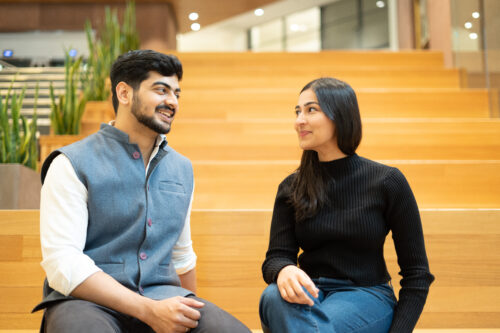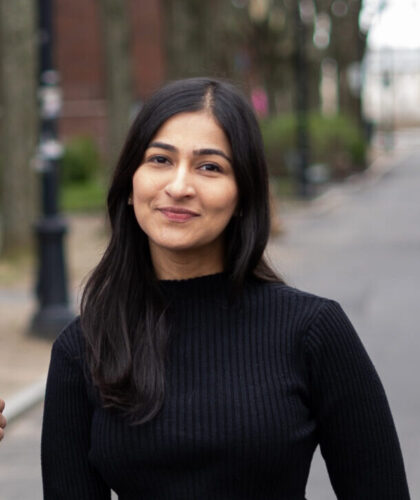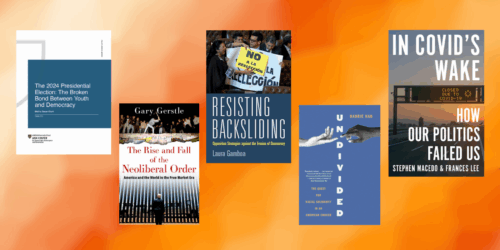When Medha Uniyal and Kartikeya Bhatotia started their journeys at Harvard Kennedy School (HKS), they decided to enroll in the Ash Center’s “The Long Road and Bumpy View to Democracy,” taught by Professor Alex Keyssar. Little did they know that the course would prove to be one of the most fundamental of their HKS careers. Not only did it provide them with a toolbox to reimagine various aspects of democracy, but it also inspired their joint Policy Analysis Exercise (PAE).
In their PAE, the two students responded to the sentiment of global democratic decline by looking for untraditional and innovative mechanisms to increase civic engagement and collect deeper citizen input through deliberative democracies. By concentrating on the deliberative model, Uniyal and Bhatotia hope to address some of the challenges that aggregate democracies face today, like extreme polarization and decreased connectivity.
With funding from the Ash Center, they teamed up with their client, Stanford Deliberative Democracy Lab, which uses deliberative polling to research how public opinion on key issues is impacting democracy. Through this work, Uniyal and Bhatotia built on what they learned in Professor Keyssar’s course to imagine what a bottom-up democracy could look like.
“We wouldn’t have been able to view [democracy] through all the different lenses without the help of Professor Keyssar,” notes Uniyal. “That’s a course we strongly recommend to any student. It was our top and favorite course.” Bhatotia adds, “Professor Keyssar’s course helped us understand what democracy can be, how decisions can move from the ground up and above, and what the expansion looks like.”
By getting people more involved on the ground levels of government through different forms of deliberative democracies, such as sortition, mini-publics, and polling, the students believe that we can diminish the gap between a country’s citizens and the governing parties that make decisions, thus fostering greater civic participation: “The closeness of citizen and state, the proximity to impact, and the speed of change impacts whether people are engaged or not engaged … I think deliberation is a way of bridging that big gap,” says Uniyal.
fruitful alternative through AI
To address many of the challenges that deliberation enablers face when trying to implement deliberative democracies more formally, Uniyal and Bhatotia recommend instituting AI technology to streamline some of the process-heavy aspects of deliberative democracy that have prevented governments from realizing its full potential.
“Things can only scale if they are cost-effective, and they’re feasible, and they’re implementable with various kinds of bodies,” asserts Bhatotia. “But we can expand on the abilities of institutions and build out the capabilities to conduct deliberative exercises through AI.”
By playing the roles of facilitator and data analyst, AI technologies can reduce the costs associated with moderating these events. They offer an online option for hosting deliberations that is often more cost-effective and easily accessible to a broader audience. Furthermore, they save time post-analysis by synthesizing the takeaways quickly and accurately.
And while there are risks associated with using AI in democratic spaces, Uniyal and Bhatotia are optimistic about these technological advancements. In the face of eroding trust in traditional forms of government, they believe that by increasing the accessibility, efficacy, and legitimacy of deliberative democracies, AI will ultimately bolster democracy.
“I think there are risks [with AI] … but it offers the dual possibility of people building trust in each other and in institutions, which is at an all-time low,” affirms Uniyal. “I think a lot of deliberations that we’ve seen rise have come from crisis … I think in times of crisis come great ideas, and not keeping an eye on them is a big failure. A big takeaway for me is that deliberation [has risen] in response to a lot of the negatives about democracy.”
Next steps after HKS
Having completed their exams and submitted their papers, the two students now have the opportunity to reflect on their time at HKS and their research for their PAE. Going forward, they’re focused on where their work can have the greatest impact.
As an expert in behavioral science and behavioral economics, Bhatotia approaches democracy from the 30,000-foot view, seeing it as a study of behavior. In his future work, he hopes to connect questions of democracy and democratization with his lifelong interest in change. “I’m fascinated by changes,” he states. “The rapid changes that are taking place in society, be it climate change, be it AI, and increased automation in the future of work.”
Prior to arriving at HKS, Uniyal worked in service delivery across industries including education, workforce development, and health care. Having completed her PAE, she now feels that she will affect the greatest change by working on the “upstream factors of governance” with organizations that provide funding for democratic expansion. Ultimately, she plans to “go back to India and work specifically on strengthening local governance and seeing how you add mechanisms of deliberation to the face of government.”





